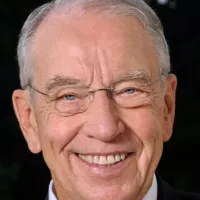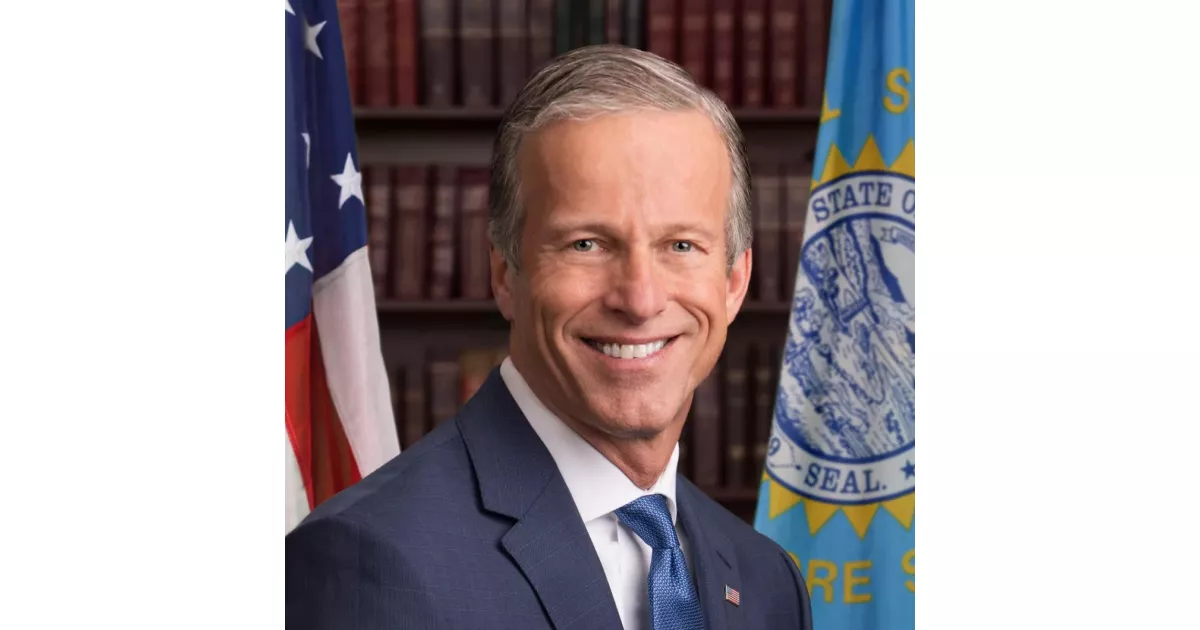From career breakthroughs to professional milestones, explore how John Thune made an impact.
John Thune is the senior United States Senator from South Dakota, serving since 2005. A Republican, he previously served as the U.S. Representative for South Dakota's at-large congressional district from 1997 to 2003. He became the Senate majority leader and Senate Republican leader in January 2025.
7 hours ago : Israel and US intensify attacks on Iran and Lebanon amid widening conflict.
Israel escalated airstrikes on Tehran as Iran expanded its response. The US joined Israel in pounding Iran and Lebanon. Oil prices surged and markets slumped amid the escalating Middle East crisis.
1952: Daschle's loss compared to Arizona Senator Ernest McFarland
Daschle's loss was the first ousting of an incumbent floor leader since 1952, when Arizona Senator Ernest McFarland lost to Barry Goldwater.
1985: Legislative Aide
In 1985, John Thune started working as a legislative aide for U.S. senator James Abdnor.
1987: End of time as Legislative Aide
In 1987, John Thune ended his time working as a legislative aide for U.S. senator James Abdnor.
1989: Executive Director of State Republican Party
In 1989, Thune moved to Pierre and became the executive director of the state Republican Party.
1991: Railroad Director of South Dakota
In 1991, Governor George S. Mickelson appointed Thune as the Railroad Director of South Dakota.
1993: Executive Director of South Dakota Municipal League
In 1993, John Thune started as the executive director of the South Dakota Municipal League.
May 1996: Hillard Leading Thune in Poll
In May 1996, a poll indicated that Carole Hillard was leading Thune by a margin of 69%-15% in the Republican primary race for South Dakota's lone seat in the U.S. House of Representatives.
1996: End of time at South Dakota Municipal League
In 1996, John Thune ended his time as the executive director of the South Dakota Municipal League.
1998: Thune Reelected to U.S. House
In 1998, Thune was reelected to the U.S. House with 75% of the vote.
2000: Thune Reelected to U.S. House
In 2000, Thune was reelected to the U.S. House with 73% of the vote.
2002: Loss to Tim Johnson
In 2002, Thune ran against incumbent Democratic U.S. senator Tim Johnson and lost by only 524 votes.
2003: Daschle Decides Not To Run For President
In early 2003, Tom Daschle decided not to run for president the following year.
November 2, 2004: Thune Defeats Daschle
On November 2, 2004, Thune defeated Daschle by 4,508 votes, winning 51% of the vote.
2004: Thune Challenges Tom Daschle
In 2004, Thune challenged Tom Daschle for the United States Senate seat.
2004: Expensive Senate Race
In 2004, the U.S. Senate race in South Dakota was the most expensive Senate race that year, costing $30 million, and the most expensive race in South Dakota's history. Daschle was labelled as an obstructionist of Bush's agenda.
2004: Strong Campaign to win 2004 race
Tom Brokaw commented that Thune "ran a very strong campaign" to win the 2004 race. After Thune defeated Daschle, many Republicans regarded him as a "rising star with unlimited political potential".
November 2006: Remarks on the Iraq War
In November 2006, John Thune stated his belief that the U.S. could win the Iraq War through stability, preventing Iraq from becoming a staging ground for terrorist attacks. He supported granting military commanders the final decision on reducing U.S. military forces.
December 6, 2006: Chief Deputy Whip
On December 6, 2006, John Thune was chosen by Senate Republican whip Trent Lott to be the GOP's chief deputy whip.
2006: Thune was chief deputy whip
Thune has served as chairman of the Republican Policy Committee from 2009 until the present time and was vice chairman of the Republican Conference from 2008 to 2009 and the Republican chief deputy whip from 2006 to 2008."
July 2008: Remarks on Iraq War success
In July 2008, John Thune remarked that the Bush administration's actions in Iraq had been a "remarkable success," noting a significant reduction in civilian casualties and criticizing Senator Barack Obama for not acknowledging the progress made.
2008: Mentioned as possible vice-presidential pick for John McCain
In 2008, John Thune was mentioned as a possible vice-presidential pick for Republican nominee John McCain in the 2008 presidential election, though he publicly downplayed the speculation.
2008: Thune was vice chairman
Thune has served as chairman of the Republican Policy Committee from 2009 until the present time and was vice chairman of the Republican Conference from 2008 to 2009 and the Republican chief deputy whip from 2006 to 2008."
March 2009: Vote Against National Service Corps Expansion
In March 2009, Thune was one of 14 senators to vote against a procedural move that essentially guaranteed a major expansion of a national service corps.
June 2009: Chairman of the Republican Policy Committee
In June 2009, after briefly serving as Republican Conference vice-chairman, Thune became chairman of the Republican Policy Committee.
December 2010: Voted against New START
In December 2010, John Thune was among 26 senators who voted against the ratification of New START, a nuclear arms reduction treaty between the United States and Russia.
2010: Congressional Budget Office Estimated Cost
In 2010, The Congressional Budget Office estimated that the bill would cost at least $418 million in the fiscal year 2010 and $5.7 billion from 2010 to 2014.
February 22, 2011: Announced he would not run for president in 2012
On February 22, 2011, John Thune announced that he would not run for president in 2012.
2011: Thune's Elevation to the No. 3 Spot
In late 2011, the Mitchell Daily Republic wrote: "Thune's elevation to the No. 3 spot makes him the highest-ranking Republican senator in South Dakota history.
January 2012: Republican Conference chairman
In January 2012, Thune was elected Republican Conference chairman.
November 2012: Requested review of Wanxiang Group's plan to acquire A123
In November 2012, John Thune, along with Chuck Grassley, requested that Treasury Secretary Timothy Geithner review the Chinese company Wanxiang Group's plan to acquire bankrupt battery maker A123, to ensure the protection of U.S. military and taxpayer interests.
2012: On Mitt Romney's short list as a potential running mate
During the summer of 2012, USA Today reported that John Thune was on Mitt Romney's short list as a potential running mate.
2012: Speculation regarding a potential 2012 presidential bid
In 2012, significant speculation arose regarding a potential presidential bid by John Thune, but he ultimately declined to run.
March 6, 2014: Introduced the Reliable Home Heating Act
On March 6, 2014, John Thune introduced the Reliable Home Heating Act (S. 2086). This bill sought to exempt motor carriers transporting home heating oil from federal safety regulations during state of emergencies caused by residential heating fuel shortages, and would also require the EIA to notify states if petroleum reserves fell below historical averages.
2014: Congressional Budget Office Estimated Cost
In 2014, The Congressional Budget Office estimated that the bill would cost at least $418 million in the fiscal year 2010 and $5.7 billion from 2010 to 2014.
March 2016: Opposed considering President Obama's Supreme Court nominee
In March 2016, John Thune opposed considering President Obama's nominee to the Supreme Court, arguing that the next president should make the appointment.
May 2016: Sent Facebook a letter requesting details on Trending Topics feature
In May 2016, John Thune sent a letter to Facebook requesting details about how it operates its Trending Topics feature, following allegations of anti-conservative bias in the selection of material. Thune later thanked Facebook for their response.
September 2016: Signed letter advocating against Russian airstrikes in Syria
In September 2016, John Thune was among 34 senators who signed a letter to Secretary of State John Kerry, advocating that the United States use "all available tools to dissuade Russia from continuing its airstrikes in Syria".
2016: Declined to seek the presidency
In 2016, John Thune declined to seek the presidency, stating that his "window ... might have closed in 2012".
2016: Calls to Wind Down Mueller Investigation
In June 2018, Thune called on Special Counsel Robert Mueller to "start winding" down his investigation into Russian interference in the 2016 presidential election.
June 2017: Co-sponsored the Israel Anti-Boycott Act
In June 2017, John Thune co-sponsored the Israel Anti-Boycott Act (s. 720), a bill that would have criminalized encouraging or participating in boycotts against Israel.
June 22, 2017: Drafted the Senate version of the American Health Care Act
On June 22, 2017, John Thune was among 13 senators who drafted the Senate version of the American Health Care Act of 2017, known as the Better Care Reconciliation Act of 2017.
October 3, 2017: Remarks following the Las Vegas mass shooting
On October 3, 2017, John Thune commented on the Las Vegas mass shooting, suggesting the shooter used conversion kits to enhance the lethality of weapons, and emphasized the importance of personal precautions for safety in an open society.
December 2017: Letter to Senate Leaders on 340B Program
In December 2017, Thune was among six senators who signed a letter requesting help to ensure the long-term sustainability of the 340B program, which mandates drug companies give discounts to health-care organizations that serve large numbers of low-income patients.
January 2018: Signed letter requesting preservation of NAFTA
In January 2018, John Thune was among 36 Republican senators to sign a letter to President Trump requesting he preserve the North American Free Trade Agreement by modernizing it for the 21st-century economy.
March 2018: Voted to table a resolution regarding American troops in Yemen
In March 2018, John Thune voted to table a resolution that would have required President Trump to withdraw American troops from Yemen unless they were combating Al-Qaeda.
June 2018: Calls to Wind Down Mueller Investigation
In June 2018, Thune called on Special Counsel Robert Mueller to "start winding" down his investigation into Russian interference in the 2016 presidential election.
July 2018: Commented on aid for agricultural producers affected by retaliatory tariffs
In July 2018, John Thune commented that the plan to provide aid for agricultural producers affected by retaliatory tariffs offered a "false and short-term" sense of security, emphasizing the importance of fair and free trade for South Dakota's farmers.
October 2018: Requested staff briefings about hardware supply chain tampering
In October 2018, John Thune requested staff briefings regarding a Bloomberg report alleging that the Chinese government had implanted malicious hardware into server motherboards, raising concerns about tampering with the U.S. hardware supply chain.
January 2019: Introduced legislation to repeal the estate tax
In January 2019, John Thune introduced legislation aimed at repealing the estate tax, a tax applicable to couples possessing estates exceeding $22.4 million.
February 2019: Sponsored the Employer Participation in Repayment Act
In February 2019, John Thune was among 20 senators who sponsored the Employer Participation in Repayment Act, which aimed to allow employers to contribute up to $5,250 towards their employees' student loans.
March 2019: Voted against the Green New Deal resolution
In March 2019, John Thune, along with most Senate Republicans, opposed the Green New Deal resolution. Thune argued against the resolution's implementation, suggesting it would be "devastating and disastrous" for the agriculture economy in South Dakota and across the United States.
March 2019: Letter to Agriculture Secretary Sonny Perdue
In March 2019, Thune signed a letter to Agriculture Secretary Sonny Perdue regarding the struggles of dairy farmers and urging consideration of the Dairy Margin Coverage program.
December 2019: TRACED Act Becomes Law
In December 2019, the Telephone Robocall Abuse Criminal Enforcement and Deterrence (TRACED) Act, co-authored by Thune, became law.
2019: Advocate for 5G and Rural Broadband
In 2019, Thune advocated for 5G deployment and rural broadband expansion, introducing related acts.
May 2020: Privacy Bill for COVID-19 Contact-Tracing Apps
In May 2020, Thune supported a privacy bill regulating data collected by COVID-19 contact-tracing apps.
September 2020: Supported immediate vote on Trump's Supreme Court nominee
In September 2020, John Thune supported an immediate vote on President Trump's nominee to fill the Supreme Court vacancy caused by Justice Ruth Bader Ginsburg's death.
December 2020: Opposed efforts to challenge 2020 election results
In December 2020, John Thune opposed further efforts to challenge the 2020 presidential election results.
January 6, 2021: Denounced Trump's role in the January 6th riot
On January 6, 2021, John Thune directly denounced President Trump for his attempts to overturn the results of the 2020 election and his role in the January 6th riot at the Capitol, calling his involvement and that of the rioters "inexcusable." Thune also voted to certify the election results.
2021: Advocate for 5G and Rural Broadband
In 2021, Thune advocated for 5G deployment and rural broadband expansion, introducing related acts.
January 2022: Thune to Seek Reelection
In January 2022, after considering retirement, Thune announced he would seek reelection to a fourth term in the U.S. Senate.
2022: Attacked by Donald Trump on Twitter
In 2022, Donald Trump attacked Thune on Twitter, and called on Kristi Noem to challenge him in the US Senate primary, after Thune opposed efforts to challenge the 2020 presidential election results.
2022: Statement on the Russian invasion of Ukraine
In 2022, following the Russian invasion of Ukraine, John Thune emphasized the necessity of military support from the U.S. and other countries for Ukraine to sustain its defense. He also urged European partners to make substantial contributions.
November 13, 2024: Thune Wins Leadership Election
On November 13, 2024, Thune won the Senate Republican Conference leadership election to become the next Senate majority leader.
November 2024: Thune Wins Leadership Election
In November 2024, following the U.S. elections in which Republicans carried the Senate, Thune was chosen to replace the retiring Mitch McConnell as Senate majority leader.
December 2024: Voted against the Social Security Fairness Act
In December 2024, John Thune was among 20 senators who voted against the Social Security Fairness Act.
January 2025: Thune Becomes Senate Majority Leader and Senate Republican Leader
In January 2025, John Thune assumed the roles of Senate majority leader and Senate Republican leader.
2025: Supported secondary sanctions against Russia
In 2025, John Thune voiced his support for secondary sanctions against Russia, which would involve imposing 500% tariffs on countries purchasing Russian oil, natural gas, uranium, and other exports.
Mentioned in this timeline

Barack Obama the th U S President - was the...
Ukraine is a country in Eastern Europe the second-largest on...
Facebook is a social media and networking service created in...
The Affordable Care Act ACA also known as Obamacare is...

Addison Mitchell McConnell III is an American politician and attorney...

Chuck Grassley is a prominent American politician and the senior...
Trending
22 minutes ago South Korea's Kospi Plunges Amid Middle East Tensions, Triggering Regional Stock Selloff
23 minutes ago US & Ecuadorian Forces Combat Drug Trafficking; General Donovan Visits; Curfew Imposed.

23 minutes ago Brandon Ingram shines with well-rounded performance, playmaking improves for the Raptors.

1 hour ago Giants to cut Bobby Okereke before free agency, impacting salary cap space.

1 hour ago Jarrett Allen's Dominance: Crushing Fears, Surging Performance, and Harden Upgrade Impact

1 hour ago Martin Clunes debuts in 'Best Medicine', discusses Doc Martin role, tense appearance.
Popular

Hillary Diane Rodham Clinton is a prominent American politician lawyer...

Jesse Jackson is an American civil rights activist politician and...

Ken Paxton is an American politician and lawyer serving as...

Jim Carrey is a Canadian-American actor and comedian celebrated for...

Bill Clinton served as the nd U S President from...

XXXTentacion born Jahseh Dwayne Ricardo Onfroy was a controversial yet...
